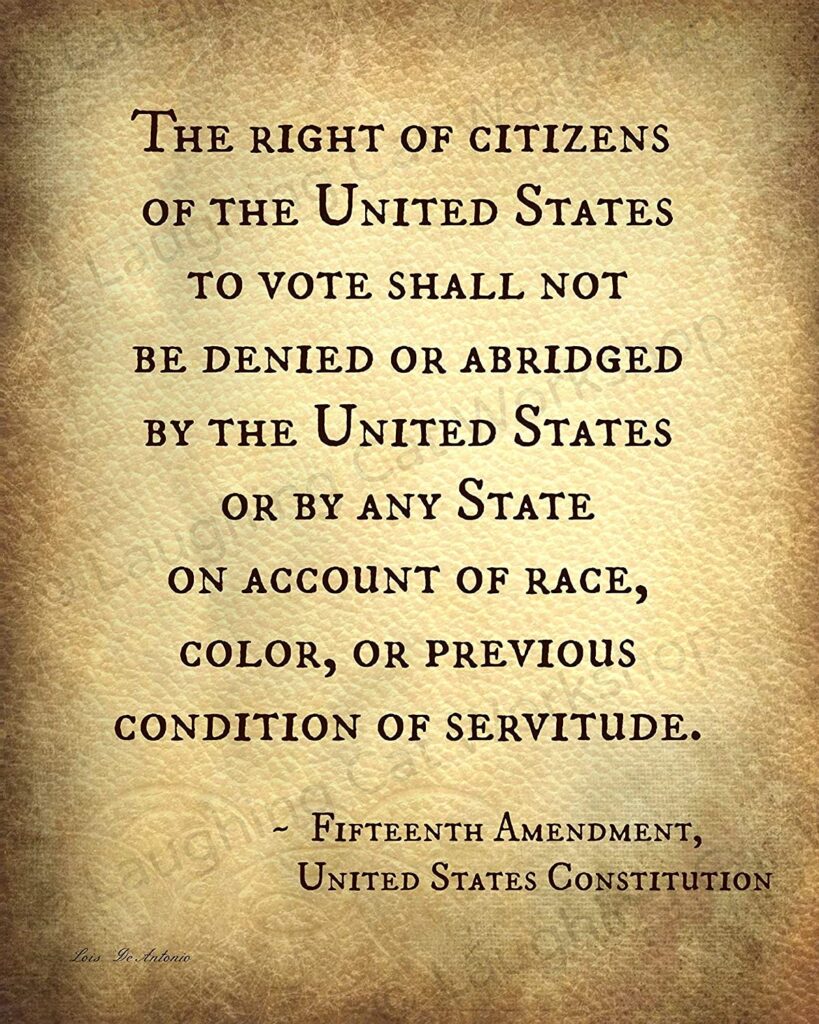
Ari Berman’s Give Us the Ballot (2015) documents the history of the Voting Rights Act of 1965. Berman’s book begins with the great struggle to bring about the VRA’s passage including one of the most dramatic moments of the civil rights era. He follows with the federal law’s transformative effect on black voter participation, the profound social and economic changes the law unleashed, the inevitable white backlash against it and, ultimately, its demise.
In a Civil War Déjà vu, the Voting Rights Act of 1965 once again imposed federal oversight upon states suffering from white supremacist ideologies.
In both centuries, political change was preceded by bloodshed. Following the election of Abraham Lincoln in 1860, eleven Southern states seceded from the Union and formed the Confederacy, with the argument that it was the states who had agreed to the Constitution therefore it was the right of the states to leave the Union. An epic war was fought to clarify the Constitutional relationship between the federal government and the states.
After hundreds of thousands of lives were lost during the Civil War, it seemed that the question of states’ rights had been settled with the addition of three amendments to the Constitution: abolishing slavery (XIII); establishing citizenship and equal protection before the law for former slaves (XIV); and guaranteeing the right to vote for all citizens (XV). A series of federal laws were passed to support the mandates of these Civil War Amendments.
Following another conflagration that again took hundreds of thousands of American lives—World War II—a Civil Rights Movement was born, and once again federal legislation offered hope. The Civil Rights Act of 1964 sought to bolster the protections of the Fourteenth Amendment. The Voting Rights Act of 1965, perhaps the most significant piece of legislation in the era, attempted to reinvigorate the Fifteenth.
In both centuries, federal mandates brought about dramatic social, political and economic gains for the historically dispossessed. During Reconstruction in the late 1860s and 1870s, African Americans were elected to office including the House of Representatives and the US Senate. Institutions were established to educate former slaves, assimilate blacks into the economy, and provide charitable relief for the impoverished.
In the 1960s and 1970s, and in much the same way, the Voting Rights Act transformed the country. Minority voter registration rolls increased exponentially, as did the number of African Americans elected to office. Resources were directed to long-neglected black communities including basic sanitation and electricity. Perhaps most importantly, white candidates throughout the South were compelled to court the black vote.
Also in both centuries, the white backlash to black progress was massive. By 1870, black citizens in every state of the former Confederacy were being terrorized by the Ku Klux Klan. Gains were made possible only through the intervention of the federal government whose military presence and voting rights oversight attempted to hold at bay the forces of white supremacy.
Following the election of 1876 and the end of the presidency of Ulysses S. Grant —a staunch supporter of African American rights—the South lobbied for the removal of this federal presence with the argument that the federal government had no business interfering with the rights of the states to manage their own affairs. (See: Grant by Ron Chernow.)
Increasingly apathetic Northerners gave in to the tenacity of Southern whites bent on denying hard-won civil rights. Late in his presidency, an embittered Grant predicted that “the results of the war of rebellion will have been in large measure lost.” He was right. In a collection of Supreme Court cases, federal laws—including the Civil Rights Act of 1875—were struck down by old white men. For the next 90 years, Southern state and local laws and practices thoroughly disemboweled the Civil War Amendments.
It was as if the Civil War had never happened. In a “redeemed” Jim Crow South blacks were relegated to conditions that resembled slavery; segregation of the races, little education, few prospects for economic gain, disenfranchisement through poll taxes, literacy tests and, most effective, intimidation.
Blacks were not only denied the right to vote, they were denied the right to due process of law and prohibited from owning firearms. Those who dared defy these norms were terrorized into submission. From the Civil War until World War II, over four thousand African Americans were lynched; often “on the courthouse lawn” and with the complete sanction of white local officials. (See: Lynching and Spectacle by Amy Louise Wood.)
Not to be outdone by their nineteenth century forbearers—with perhaps more subtlety than violence—Southern whites of the 1960s and 1970s responded to the gains made through the Voting Rights Act of 1965 with a variety of supposedly “race-neutral” efforts to restrict the black vote: at-large elections that left areas with 30 to 40 percent black populations with no black representation; racial gerrymandering of districts to minimize the number of blacks elected; changing elected positions to appointed positions; dual registration requirements where citizens must register for county and city elections separately; requiring periodic re-registration; requiring strict voter identification; a criminal justice system that targets minorities often resulting in life-time disenfranchisement; white employers demanding overtime from black employees on election day; and, in an admittedly tamer yet no less atrocious shout-out to the 1870s, voter intimidation and polling location “monitoring.”
Just as the Supreme Court of the late 1800s rejected the intent and, indeed, the very spirit of our Constitution, the Supreme Court of 2013 piped in on the Voting Rights Act of 1965. In Shelby County v. Holder, 2013, in a 5 to 4 vote, the High Court determined that the VRA was no longer necessary because it was “based on 40 year-old facts having no logical relationship to the present day.”
The argument that won the day is as old as the country itself: five men determined in the twenty-first century that we are now a much more enlightened society, free of systemic racism, and most gloriously, completely unburdened by our past.



